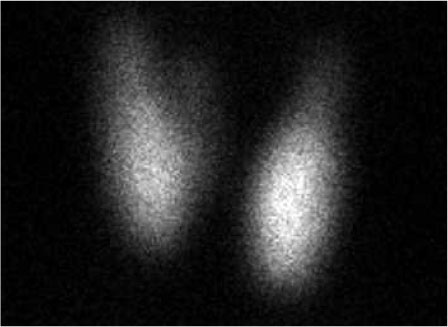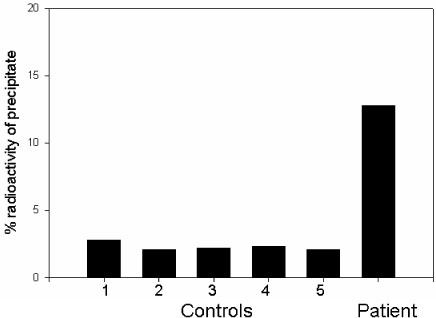J Korean Endocr Soc.
2006 Oct;21(5):428-432. 10.3803/jkes.2006.21.5.428.
A Case of Primary Hypothyroidism with Anti-Triiodothyronine Autoantibody
- Affiliations
-
- 1Department of Internal Medicine, SoonChunHyang University Hospital, Korea.
- 2Institute of Endocrinology Research, SoonChunHyang University Hospital, Korea.
- KMID: 1511995
- DOI: http://doi.org/10.3803/jkes.2006.21.5.428
Abstract
- Antithyroid hormone autoantibodies can be present in the sera of patients with thyroid and non-thyroid disorders. Antithyroid hormone autoantibodies in a patient's serum interfere with radioimmunoassay of thyroid hormones. Clinically, this interference can result in discordance between the serum thyroid hormone levels and the clinical features of the patient, which can lead to misdiagnosis or inappropriate treatment. We experienced a woman who had primary hypothyroidism with unexpectedly high concentrations of serum total triiodothyronine (T(3)) and free T(3), and she had been treated for Graves' disease in the past. Through the use of a polyethylene glycol precipitation method, we detected the anti-triiodothyronine autoantibodies in her serum. We report on this case along with a review of the related literature.
MeSH Terms
Figure
Reference
-
1. Robbins J, Rall JE, Rawson RW. An unusual instance of thyroxine-binding by human serum gamma globulin. J Clin Endocrinol Metab. 1956. 16:573–579.2. Premachandra BN, Ray AK, Hirata Y, Blumenthal HT. Electrophoretic studies of thyroxine and triiodothyronine binding by the sera of guinea pigs immunized against thyroglobulin. Endocrinology. 1963. 73:135–144.3. Rodriguez-Espinosa J, Gomez-Gerique JA, Ordonez-Lianos J, Soldevila-Bosch J, Concustella-Bas E. Circulant anti-triiodothyronine antibodies in a patient with Graves' disease: effects on measurement of T3 with different RIA procedures. Clin Chim Acta. 1980. 106:173–181.4. Sakata S, Nakamura S, Miura K. Autoantibodies against thyroid hormones or iodothyronine. Implications in diagnosis, thyroid function, treatment, and pathogenesis. Ann Intern Med. 1985. 103:579–589.5. Rodriguez-Espinosa J, Ordonez-Lianos J, Gomez-Gerique JA, Mora J. Anti-triiodothyronine autoantibodies interfere with two recently commercialized radioimmunoassays for free triiodothyronine. Clin Chem. 1984. 30:151–152.6. Beck-Peccoz P, Romelli PB, Cattaneo MG, Faglia G, White EL, Barlow JW, Stockigt JR. Evaluation of free thyroxine methods in the presence of iodothyronine-binding autoantibodies. J Clin Endocrinol Metab. 1984. 58:736–739.7. Allan DJ, Murphy F, Needham CA, Barron N, Wilkins TA, Midgley JE. Sensitive test for thyroid hormone autoantibodies in serum. Lancet. 1982. 320:824.8. Chung YE, Han JH, Lee SJ, Min WK, Park KY, Park KK, Moon DH, Ahn IM. A case of Hashimoto's thyroiditis with anti-triiodothyronine autoantibody. J Kor Soc Endocrinol. 2001. 16:245–251.9. Nakamura S, Murayama M, Kojima N, Kamikubo K, Sakata S, Yasuda K, Miura K. Thyroid hormone autoantibodies in Hashimoto's disease and Graves' disease. Nippon Naibunpi Gakkai Zasshi. 1983. 59:1597–1607.10. Erregragui K, Cheillan J, Defoort JP, Prato S, Fert V. Autoantibodies to thyroid hormones: the role of thyroglobulin. Clin Exp Immunol. 1996. 105:140–147.11. Volpe R. Werner SC, Ingbar SH, editors. Lymphocytic (Hashimoto's) thyroiditis. The Thyroid. 1978. New York: Harper & Row;998.12. Hehrmann R, Hoffken B, von zur Muhlen A, Creutzig H, Thiele J, Hesch RD. Anti-thyroid hormone autoantibodies under experimental and clinical conditions. Horm Metab Res. 1977. 9:326–332.13. Refetoff S. Syndromes of thyroid hormone resistance. Am J Physiol. 1982. 243:E88–E98.14. Wortsman J, Premachandra BN, Williams K, Burman KD, Hay ID, Davis PJ. Familial resistance to thyroid hormone associated with decreased transport across the plasma membrane. Ann Intern Med. 1983. 98:904–909.15. Borst GC, Eil C, Burman KD. Euthyroid hyperthyroxinemia. Ann Intern Med. 1983. 98:366–378.16. Nakamura S, Fushimi K, Okuyama M, Miura K. A study on anti-T3 and anti-T4 autoantibodies found in two sisters with juvenile hypothyroidism due to Hashimoto's thyroiditis. Nippon Naibunpi Gakkai Zasshi. 1982. 58:9–23.17. Ochi Y, Shiomi K, Hachiya T, Yoshimura M, Miyazaki T. Immunological analysis of abnormal binding of thyroid hormone in the gamma-globulin. J Clin Endocrinol Metab. 1972. 35:743–752.18. Sakata S, Komaki T, Nakakmura S, Kamikubo K, Takakuwa K, Kametani M, Tokimitsu N, Miura K. A case of Graves' disease with anti-triiodothyronine antibodies. Endocrinol Jpn. 1985. 32:181–188.19. Geola FL, Hershman JM, Reed AW, Premachandra BN. Circulating thyroid hormone autoantibodies in a hypothyroid patient: effect on thyroxine metabolic clearance rate. J Clin Endocrinol Metab. 1981. 41:580–586.
- Full Text Links
- Actions
-
Cited
- CITED
-
- Close
- Share
- Similar articles
-
- A Case of Subclinical Hypothyroidism Associated with Turner's Syndrome
- The relationship between subclinical hypothyroidism and serum levels of uric acid and creatinine in children aged 2–14 years
- Changes of antithroglobulin antibody in children with congenital hypothyroidism
- A Case of Hashimotos Thyroiditis with Anti-Triiodothyronine Autoantibody
- Prospective Observation of 5-Year Clinical Course of Subclinical Hypothyroidism in Korean Population



